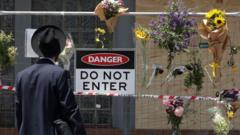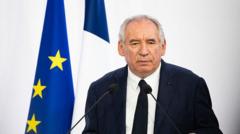Is Iran Behind the Antisemitic Attacks in Sydney and Melbourne?

Published: 2025-08-26 05:14:24 | Category: technology
Australia has announced the expulsion of Iran's ambassador, Ahmad Sadeghi, following allegations that the Iranian government orchestrated antisemitic attacks on Jewish targets in Sydney and Melbourne. These incidents, which took place last year, have raised serious concerns about foreign interference and safety within Australian borders.
Last updated: 15 October 2023 (BST)
Key Takeaways
- Australia expelled Iran's ambassador and three officials over alleged antisemitic attacks.
- The attacks reportedly occurred in October and December 2022.
- ASIO provided intelligence suggesting Iran's involvement and potential further attacks.
- This is the first ambassador expulsion in Australia since World War II.
- The Australian government plans to designate the Islamic Revolutionary Guard Corps as a terrorist organisation.
Background of the Allegations
In a statement, Prime Minister Anthony Albanese described the attacks as "extraordinary and dangerous acts of aggression orchestrated by a foreign nation." The incidents in question involved attacks on two prominent Jewish locations: the Lewis Continental Kitchen in Sydney and the Adass Israel Synagogue in Melbourne. Both locations were targeted for their association with the Jewish community.
While no injuries were reported during these events, the implications of these attacks have prompted significant concern among both the government and the public. The Australian Security Intelligence Organisation (ASIO), headed by Mike Burgess, reported that there was credible intelligence linking Iran to these incidents and warned of potential future threats to Jewish targets in Australia.
Details of the Attacks
On 20 October 2022, the Lewis Continental Kitchen in Sydney was attacked. This was followed by an incident at the Adass Israel Synagogue in Melbourne on 6 December 2022. The nature of these attacks is reported to have involved vandalism and intimidation, specifically targeting the Jewish community. ASIO's assessment indicates that Iran attempted to mask its involvement, signalling a level of sophistication in how these acts were orchestrated.
Government Response and Diplomatic Relations
In light of these developments, the Australian government has taken a firm stance, ordering the expulsion of the Iranian ambassador and three other officials, who are required to leave within seven days. This action marks a significant moment in Australia's diplomatic history, as it is reportedly the first time since World War II that an ambassador has been expelled due to such serious allegations.
Foreign Minister Penny Wong indicated that while Australia is suspending operations at its embassy in Iran for the safety of staff, some diplomatic channels will remain open. She also urged Australian citizens not to travel to Iran and advised those currently in the country to leave if it is safe to do so.
Designation of the Islamic Revolutionary Guard Corps
In addition to the expulsion of the ambassador, the Australian government has announced plans to designate Iran's Islamic Revolutionary Guard Corps (IRGC) as a terrorist organisation. This designation is expected to have significant implications for Australia-Iran relations, particularly in terms of security and counter-terrorism efforts.
The IRGC has been implicated in numerous acts of aggression and interference in various countries, and this move underscores Australia's commitment to combating foreign threats and protecting its citizens.
What Happens Next?
As the situation develops, Australia's actions could lead to a broader reassessment of its diplomatic ties with Iran. The expulsion of the ambassador and the potential terrorist designation of the IRGC may provoke a response from the Iranian government, which has yet to comment on these accusations. Observers are keen to see how both nations will navigate this diplomatic rift moving forward.
Furthermore, the implications of these actions extend beyond bilateral relations. They may also influence Australia's position in the international community regarding sanctions and responses to foreign interference. The government's recent measures signal an increasingly proactive approach to safeguarding national interests in a complex geopolitical landscape.
Broader Implications for National Security
The allegations against Iran and the subsequent expulsion of its ambassador have reignited discussions about national security in Australia. The growing concern over foreign interference is not limited to Iran; various nations are under scrutiny for similar activities. The ASIO's warning about potential future attacks underscores the need for vigilance and proactive measures to protect vulnerable communities.
Prime Minister Albanese's government is expected to enhance measures aimed at preventing foreign influence and protecting citizens from potential threats. This may include increased funding for intelligence and security agencies, as well as legislative changes to address foreign interference more effectively.
Conclusion: A Critical Moment for Australia
Australia's decision to expel the Iranian ambassador marks a critical moment in its foreign policy and national security strategy. It reflects a growing awareness of the risks posed by foreign governments and their potential impact on domestic safety. As the situation evolves, the Australian government will need to balance diplomatic relations with firm actions to protect its citizens.
In this rapidly changing geopolitical landscape, the actions taken by Australia may serve as a precedent for other nations facing similar challenges. The international community will undoubtedly be watching closely to see how this situation unfolds and what it means for global security dynamics.
FAQs
Why was Iran's ambassador expelled from Australia?
Iran's ambassador was expelled due to allegations that the Iranian government orchestrated antisemitic attacks on Jewish targets in Sydney and Melbourne, which raised serious concerns about foreign interference.
What specific incidents led to the expulsion?
The expulsion followed attacks on the Lewis Continental Kitchen in Sydney on 20 October 2022 and the Adass Israel Synagogue in Melbourne on 6 December 2022, both targeting the Jewish community.
What will happen to diplomatic relations between Australia and Iran?
While Australia has suspended operations at its embassy in Iran, some diplomatic channels will remain open. However, the relationship is likely to be strained due to the expulsion and the designation of the IRGC as a terrorist organisation.
What is the Islamic Revolutionary Guard Corps (IRGC)?
The Islamic Revolutionary Guard Corps (IRGC) is a branch of Iran's armed forces, responsible for safeguarding the Islamic Republic's regime and has been implicated in various acts of aggression and foreign interference.
How does this affect national security in Australia?
The expulsion highlights Australia's commitment to national security and countering foreign interference, prompting discussions on enhancing protective measures for its citizens and communities.



